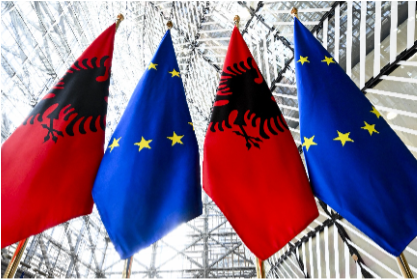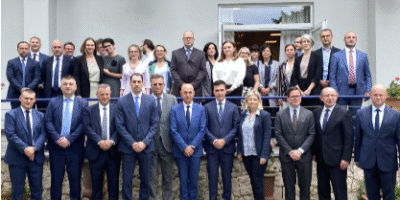European Union officials have issued a clear and firm message to Albania: continued progress toward EU membership hinges on meaningful implementation of justice reform, credible electoral processes, and a renewed spirit of political cooperation.
These were the core themes emerging from the latest Stabilization and Association Parliamentary Committee (SAPC) meeting held in Strasbourg, where Albania’s accession path came under critical review.
Addressing the session, Sigrid Brettel, the European Commission’s representative, described Albania’s justice reform as “unprecedented” both in scale and in significance. She emphasized the pivotal role of the Special Anti-Corruption Structure (SPAK), calling it “the most trusted institution in the country,” and reiterated the EU’s demand for its institutional independence to be protected. “Justice reform must continue. The credibility of the accession process depends on it,” Brettel stated. “This autumn, Albania is expected to pass key legislative packages on anti-corruption, conflict of interest, justice system oversight, and media freedom.”
Brettel also acknowledged steps taken in fighting organized crime and corruption, while underlining that the independence of prosecutorial bodies and media pluralism remain under watchful EU scrutiny.
Despite some progress, the EU remains concerned about electoral practices in Albania. The OSCE/ODIHR election observation mission reported irregularities during the 2025 general elections, including misuse of public resources and pressure on public servants. In response, Brettel welcomed the creation of a joint Electoral Crime Task Force, comprising SPAK, the Prosecutor General’s Office, and the Central Election Commission (CEC), but noted that results must follow. Political divisions in Albania also took center stage in Strasbourg. In a tense exchange, Interior Minister Taulant Balla and Democratic MP Jorida Tabaku clashed over responsibility for stalling electoral reform.
Balla insisted that the Socialist Party is ready to resume reform talks this September and open the door to a depoliticized electoral system. However, Tabaku countered that the government has ignored ODIHR’s priority recommendations for over a decade and accused it of using unilateral reforms, including controversial 2021 changes, to consolidate power.
“Since 2013, ODIHR’s key recommendations remain unaddressed. Electoral reform should not be driven by ruling-party convenience,” Tabaku declared.
Taking a sharper tone, Gazment Bardhi, leader of the Democratic Party’s parliamentary group, challenged the European Commission’s reliance on strategy documents, stating that “tangible results” are missing. He criticized SPAK for what he described as an institutional retreat following Prime Minister Edi Rama’s February remarks, in which the premier allegedly urged state institutions to halt politically sensitive investigations during the campaign period.
“After Rama’s public statement, SPAK disappeared from the scene. Not a single electoral crime case has been pursued,” Bardhi said, calling for stronger EU pressure on Tirana to uphold the rule of law in practice, not just in principle.
Despite political clashes, EU officials reaffirmed Albania’s status as one of the leading candidates in the Western Balkans. But they were unanimous: the credibility of the process depends on action.
Suzana Melkalkova, head of the Western Balkans Division at the European External Action Service, reiterated the EU’s support for Albania’s 2027 membership target but warned there are “no shortcuts” on the road to accession. “We are closely watching judicial reforms, political dialogue, and media freedom. The polarization in Albanian politics is concerning. Constructive dialogue is essential,” Melkalkova said.
Backing these sentiments, Krzysztof Łącki, representing the Polish Presidency of the EU Council, praised Albania’s continued alignment with EU foreign and security policy, calling it a “strategic commitment,” but highlighted that domestic reforms must remain a top priority.
Moreover, with autumn legislative deadlines fast approaching, EU officials expect the Albanian Parliament to move forward on reforms addressing corruption, justice oversight, and election integrity. The credibility of the Albanian government and opposition alike will depend on whether these reforms are undertaken in a bipartisan,
transparent, and timely manner. While Albania continues to brand itself as a regional leader in the EU enlargement process, Brussels is looking for results—not rhetoric. The Strasbourg session made it clear that Albania’s accession will be judged not by political declarations, but by whether the country can deliver sustained, verifiable reforms that bring its democratic and judicial institutions in line with EU standards.
Written by our correspondent A.T.



